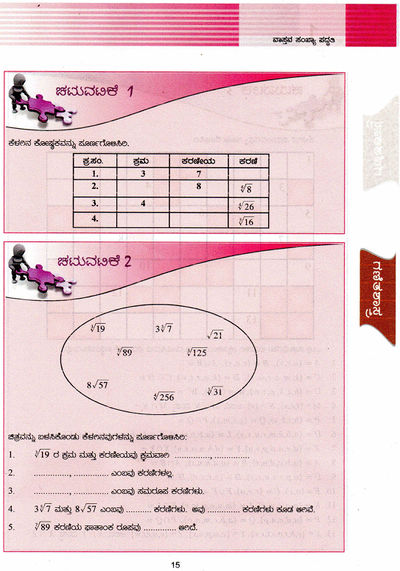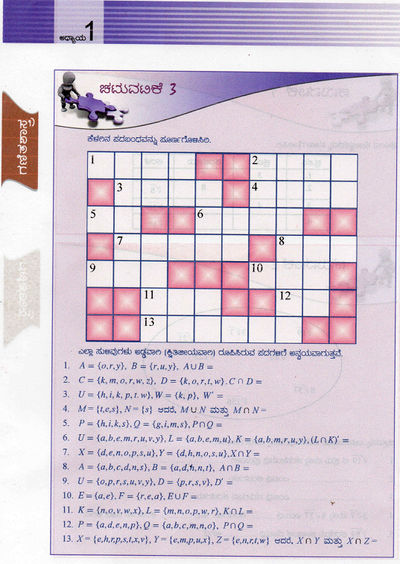Difference between revisions of "Sets"
| Line 41: | Line 41: | ||
{{#widget:YouTube|id=WqYQ3OakKP0}} | {{#widget:YouTube|id=WqYQ3OakKP0}} | ||
{{#widget:YouTube|id=jAfNg3ylZAI}} | {{#widget:YouTube|id=jAfNg3ylZAI}} | ||
| + | {{#widget:YouTube|id=TZRBtiyVKcM}} | ||
==Reference Books== | ==Reference Books== | ||
Revision as of 10:02, 16 September 2014
| Philosophy of Mathematics |
While creating a resource page, please click here for a resource creation checklist.
Concept Map
Error: Mind Map file set theory.mm not found
Textbook
To add textbook links, please follow these instructions to: (Click to create the subpage)
Tamil Nadu text book for Class 9, chapter 4 , pages 17 to 23
Additional information
Useful websites
- Wikipedia page for Set
- This web gives basic ideas about sets mathsisfun.com
- Video on union and itersection of sets.
Reference Books
ACTIVITY 1 :
1. Collect different kinds of objects. 2. Put the all objects in a box. 3. Calling 2 or 3 students and telling them to pick up things of same kind.
ACTIVITY 2:
1. Put the prepared number cards in another box.
2.Call a student and tell him to pick any 10 numbers.
3.Call a student and tell him to collect natural number
4. Similarly we can call many students to come and ask them to collect odd, even numbers etc.
DEVELOPING QUESTIONS:
1. Can you call that mixing group of objects by a particular name?
2. Does any number is repeated while collecting numbers?
3. What is the difference between before and after grouping the objects?
QUESTIONS:
1.Can we say that whole group of objects is a set ?
2..Define a set.
3. Give an example for a set.
==================================================
Teaching Outlines
Concept #1.Introduction to Sets
Learning objectives
- Differentiate between a group and a set
- To identify a set
- To give examples for a set.
Notes for teachers
Helping the children in the identification of a set
Activity No #1 Making Sets
- Mixing different kinds of objects in a box .
- Mixing different kinds of number cards in a box.
- Materials/ Resources needed
Scales, pencils, pens, toys of birds and animals, different coloured bangles. , number cards and 2 boxes. Required time - 20 minutes
- Prerequisites/Instructions, if any
To be careful about glass bangles.
- Multimedia resources
- Website interactives/ links/ simulations
Click here to view explanation about the definition of set. http://www.mathsisfun.com/sets/sets-introduction.html
- Process/ Developmental Questions
- Evaluation
- Question Corner
Activity No #2.
- Materials/ Resources needed
- Prerequisites/Instructions, if any
- Multimedia resources
- Website interactives/ links/ simulations
- Process
1st step
- Collect different kinds of objects.
- Put the all objects in a box.
- Calling 2 or 3 students and telling them to pick up things of same kind.
2nd step
- Put the prepared number cards in another box.
- Call a student and tell him to pick any 10 numbers.
- Call a student and tell him to collect natural number
- Similarly we can call many students to come and ask them to collect odd, even numbers etc.
- Developmental Questions
- Can you call that mixing group of objects by a particular name?
- Does any number is repeated while collecting numbers?
- What is the difference between before and after grouping the objects?
- Evaluation
- Can we say that whole group of objects is a set ?
- Define a set.
- Give an example for a set.
- Question Corner
Concept #2.Representation of sets.(A)Rooster method:
Sets can be represented in two different ways: Rooster method and Rule method.
Learning objectives
Notes for teachers
Activity No #1.
- Materials/ Resources needed
- Prerequisites/Instructions, if any
- Multimedia resources
- Website interactives/ links/ simulations
- Process/ Developmental Questions
- Evaluation
- Question Corner
Activity No #2.
- Materials/ Resources needed
- Prerequisites/Instructions, if any
- Multimedia resources
- Website interactives/ links/ simulations
- Process/ Developmental Questions
- Evaluation
- Question Corner
concept #2(B):Set builder method or rule method
Learning objectives
Notes for teachers
Activity No #1.
- Materials/ Resources needed
- Prerequisites/Instructions, if any
- Multimedia resources
- Website interactives/ links/ simulations
- Process/ Developmental Questions
- Evaluation
- Question Corner
Activity No #2.
- Materials/ Resources needed
- Prerequisites/Instructions, if any
- Multimedia resources
- Website interactives/ links/ simulations
- Process/ Developmental Questions
- Evaluation
- Question Corner
Project Ideas
Fun corner
Usage
Create a new page and type {{subst:Science-Content}} to use this template

